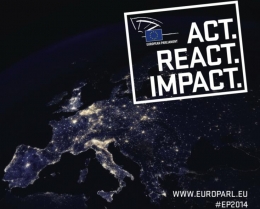The European Parliament Office in Ireland is to work with immigrant groups to encourage the new Irish citizens to participate in next year’s European elections.
Addressing participants at a briefing on the European Parliament’s upcoming information campaign on the elections, head of office Francis Jacobs said both new Irish citizens and other EU citizens in Ireland should have a say in who is elected to the European Parliament.
“So many things that affect their lives are arguably under the control of the EU,” Jacobs told Metro Éireann, adding that every vote has an effect on how decisions are made at the European Parliament.
Participants also heard that the European Parliament that will emerge after the election will be unlike any elected previously, as a statement from the office elaborated.
“First, because the Lisbon Treaty has handed extensive powers to the European Parliament on EU laws, the EU budget, international treaties and other areas, parliament now has the power to change the way the European Union is governed and the policies that are adopted every day at European level.
“Second, the European political groups of the European Parliament plan for the first time to go into the European Elections with their own candidates for the post of President of the European Commission.”
The office said it believes that people exercising their right to vote in the election “will make a difference” now more than ever.
A number of other issues regarding the election, such as representation of women and independent candidates, as well as constituency adjustments, were also raised at the briefing.
Arthur Beesley, one of three panellists and a former EU correspondent for The Irish Times, told the audience that the issue of candidate substitution – a system whereby an elected candidate can resign and substitute his or her name with another person named as a substitute before the election – “was part and parcel of political life” and that voters “just have to live with it”.
However, he said the public needed to know more about the substitutes ahead of the polls, and that the media could do more to highlight who they are and what they stand for.
On opportunities for independent candidates, Beesley said it would be difficult for them to achieve big wins in the election.
He also cited the current boundary adjustment as a serious challenge for independent candidates, as some of the current candidates are losing many of their catchments areas.
His views were shared by fellow panellist, UCD political scientist Prof David Farrell, who said it would be tough to see independent candidates succeed in future European Union elections, adding that only very well-known people like broadcaster Gay Byrne are the type of independents that could do well.
As far as political support for women candidates – who, as one participant claimed, tend to perform better at EU elections – Beesley said he believed parties would opt for the candidates they believe have the best chances of winning regardless of gender.












